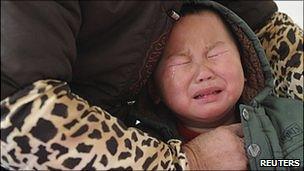Chemical leak at China factory 'poisons workers'
- Published

More than 200 children were diagnosed with having excessive lead in their blood
A chemical leak at a factory in eastern China's Anhui province has poisoned 62 workers, state media reports.
Thirty-seven people are still in hospital after inhaling fumes on Thursday at the company in Suzhou.
An inquiry is under way, but state media said the leaked chemical was phosgene, used to make pesticides, painkillers and antibiotics.
It comes as the relatives of 24 children being treated for suspected lead poisoning are calling for answers.
On Thursday authorities in Anhui shut two battery factories after more than 200 children were found to have elevated levels of lead in their blood.
Those affected came from homes close to battery factories, despite laws prohibiting factories from being located within 500m (1,600ft) of residential areas.
"Children are precious to us. You tell me what I can do. I don't have many requests. The government has to stand up and give the children some answers and help," said 48-year-old Li Xiaoai, grandmother of three-year-old Jiang Shuangchao.
Her granddaughter was found to have 245 micrograms (mcg) of lead per litre of blood.
A level of 100mcg per litre is considered enough to impair brain development in children.
Excessive amounts of lead in the blood can cause damage to the digestive, nervous and reproductive systems, and also stomach aches, anaemia and convulsions.
- Published6 January 2011
- Published20 September 2010